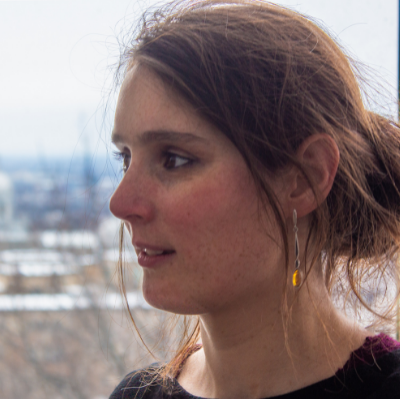Leïla Barbedette
Bachelor of music student

- Where are you from?
I’ve been a maker of instruments for string quartet since 2006, I grew up in Paris, where I developed a love for old stonework settings, for the paintings and music they contain and for the life and the ideas that teem inside them. In 2012 I arrived in Montréal to learn other ways of working and a different culture from my own.
- Could you talk to us briefly about your background?
I’ve always felt the longing to sing, at the same time as my desire to create string-quartet instruments. Meeting my voice teacher, Philippe Bolduc, encouraged me to deepen my learning of singing. It was with that goal that I enrolled in the Université de Montréal Faculty of Music in 2019.
- Why choose to do your studies at the Faculty of Music?
I first wanted to study classical singing, but finally, I realize that one of the underlying reasons for my going back to university was also a desire for intellectual stimulation. The bachelor of music degree often seems to be misunderstood: it allows me to have contact with different disciplines. It gives me the opportunity to meet students in different programs, which is something extremely valuable.
- What do you like most about the Faculty?
The courses allow me to acquire new knowledge and skills, but also to meet all the people who are the life of the Faculty. I find the UdeM Faculty of Music to be very family-like and welcoming when it’s operating normally: “in person.” I was quite surprised by the level of guidance we get here. That creates a proximity between students and teaching staff that is really helpful for learning.
- Which teacher inspires you?
Caroline Traube, who teaches musical acoustics and psychoacoustics. She has a gift for making her material accessible to musicians who sometimes have no scientific background, as is the case with me. She talks about research with great simplicity and a contagious sparks. Her multidisciplinarity speaks to me directly and gives me the confidence to indulge my inclinations to explore fields whose complementarity is not “officially recognized.” In offering me a teaching-assistant contract, Caroline Traube also allows me to discover the joys of heading laboratory sessions and sharing that material with students currently taking courses.
- Have you done any learning at the Faculty whose existence or usefulness you wouldn’t have suspected before?
I can’t say I wouldn’t have suspected the existence or usefulness before, but yes – acoustics! I have a passion for that subject, and I encourage instrument makers and musicians to take that course for a better understanding of their core material, which is sound. It’s fascinating!
I didn’t imagine I’d find such a concrete way here of relating singing to instrument making. I did research work for the course on musical instrument acoustics given by Vincent Verfaille and I’m now starting to go deeper into the subject in work directed by Caroline Traube. I hope to take it even further in a master’s program.
- In what way is your stay at the Faculty of Music influencing your life?
I wasn’t thinking of doing a master’s when I got here. That’s been the plan for a year now. It means me taking an unwelcome break from my profession, which I love deeply, but I’m looking for knowledge here that will be useful to me one day. For the time being, it’s hard to know where these several changes will take me, but I feel they’ll allow me to chart a very special path that will open unsuspected doors to me.
- In your stay at the Faculty of Music, you must have come across remarkable people who’ve had an impact on your development. Can you speak to us about some of them?
Of course, Caroline Traube, who I talked about earlier, but also Gabrielle Therrien, who teaches solfege with great warmth; Matthew Lane, who led me to a discovery of and love for harmony; François de Médicis and his passionate recounting of music history; Federico Lazzaro, who hired me as an assistant for the OICRM’s Équipe Musique en France and gave me the opportunity to write my first article; Marie-Hélène Benoit-Otis, who supervised me in the writing of that article; and Luce Beaudet: she opens our ears, but above all reveals a great inner freedom we can’t help but admire and that makes us want to follow in her footsteps as we diligently pursue our goals. Sylveline Bourion, the head of my program, and Mathieu Lussier, vice-dean of undergraduate studies, each in their own way has been very receptive to certain questions that arose in the course of my work here and helped me find solutions to them.
All these people have contributed to giving me greater assurance through their teaching and through the confidence they’ve shown in me.
- What advice would you give to a first-year student?
Take advantage of library training, go out and meet other students, ask questions in class, go to concerts, take part in the student association. And don’t hesitate to search elsewhere for what you can’t find at the university.
- What are the 3 most important qualities for a musician?
1. Learn to know yourself.
1. Be attentive to the people you meet.
2. Don’t keep yourself from doing what you feel like doing despite external pressure or the pressure you put on yourself.
- Beyond music, what are your interests or passions?
Encounters, life in society, and politics.
- What are your plans for the future?
Find more time for instrument making, sing and share the knowledge I’ve gained at the Faculty with my instrument-maker colleagues and the musicians I work with.
March 2022